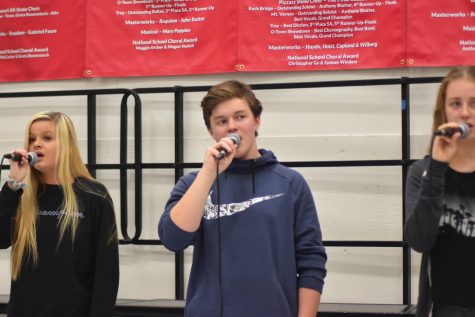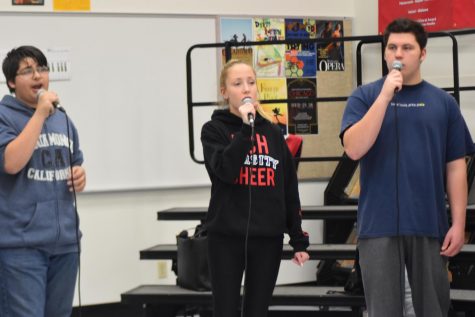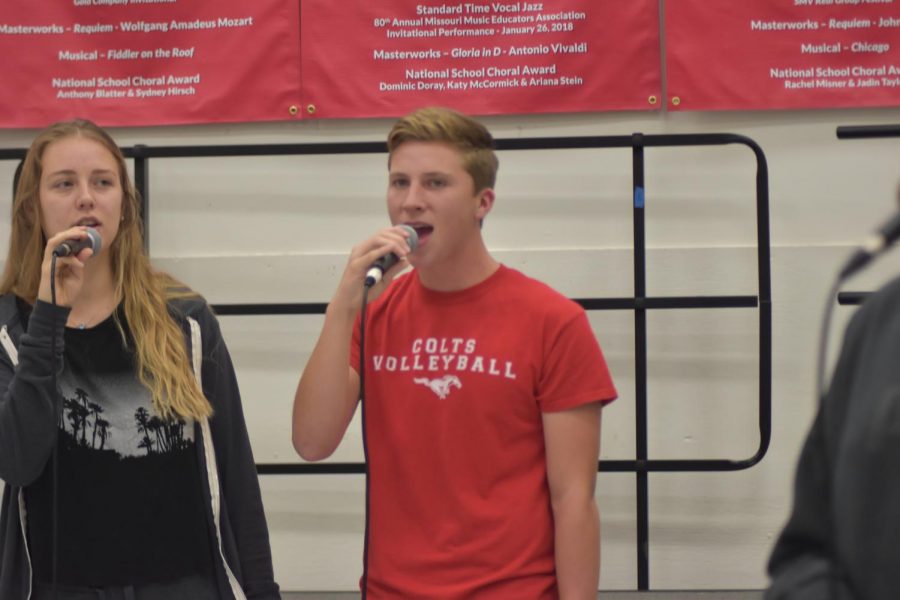Musical Superhumans
November 11, 2019
Imagine having a student in a music class with a “1 in 10,000” musical superpower. Now imagine having two of them in the same class. This sounds like a choir director’s daydream, but this is reality for multiple classes in Parkway Central’s choir program.
What is this so called superpower? It’s called “perfect pitch,” and it gives people the ability to know what exact notes are being played around them.
“You can say the letter name of a note, A, B, C, D, E, F, G, and someone with perfect pitch can sing it back to you,” choir director Ben Silvermintz said.
Junior Alex Radina and Senior Charlie Schaeffer both have “perfect pitch,”which means they are born with an internal tuner. If you tell one of them to sing a C, they can sing a C completely in tune. They also have the ability to tell if a note from another instrument or singer is out of tune.
This is extremely useful for singing. For a normal singer, it can sometimes be challenging to sing in tune. Teachers will often play the piano while students are singing to make sure the student doesn’t stray off the correct notes. For students with perfect pitch, this is never an issue.
Both Radina and Schaeffer are in Concert Choir and “Standard Time,” the two most prodigious choirs at PCHS.
“It’s helpful because if you have a pitch in your mind you can affiliate with a certain note, then you don’t have to do any of the technical stuff like solfege or syllables in order to find it,” Schaeffer said.
Even though Psychology Today claims perfect pitch is a “1 in 10,000” talent, this is completely unsubstantiated. Still, having perfect pitch is still a rare talent. Silvermintz has had roughly five students with perfect pitch in his ten years of teaching.
“It’s pretty unusual. It’s a good problem,” Silvermintz said.

There is some controversy in the music community about whether perfect pitch is something you’re born with or something you can obtain.
“I don’t think it’s impossible to possibly learn how to do it, but I think it would take a lot of practice,” Radina said. “You would have to consistently keep up that practice, otherwise you’d lose it.”
If you are sad you will never have perfect pitch, don’t fret. You can still get something almost as good called relative pitch. With relative pitch, if you are given a single note, you can sing other notes based on how that first note sounded. While this isn’t the same as perfect pitch, this is something almost everyone can learn.
“You’re born with perfect pitch, [whereas] you can nurture relative pitch,” Silvermintz said. “People I know that are brilliant musicians who aren’t born with perfect pitch, they can have almost perfect pitch, but they still have to do just a little more functional work upstairs to do that.”
An example of a student with great relative pitch is senior Corbett Harris, also in Concert Choir and “Standard Time”. Though she can not sing an F if you tell her to sing an F, she has other abilities she has nurtured throughout her career as a choir student.
“What I don’t have is perfect pitch, but I can hear very easily whenever notes are flat or sharp,” Harris said.
The ability to confidently sing in tune is not as freakish as having perfect pitch, but it is still invaluable as a singer to have. If you’re jealous of Radina or Schaeffer, know that it doesn’t mean you can’t be successful as a musician.
“If you hear those notes many times repeatedly, you can start to become more familiar with them,” Harris said. “Practice with your voice so you can know when something feels right on the note or when it doesn’t, and just become familiar with that sound.”



